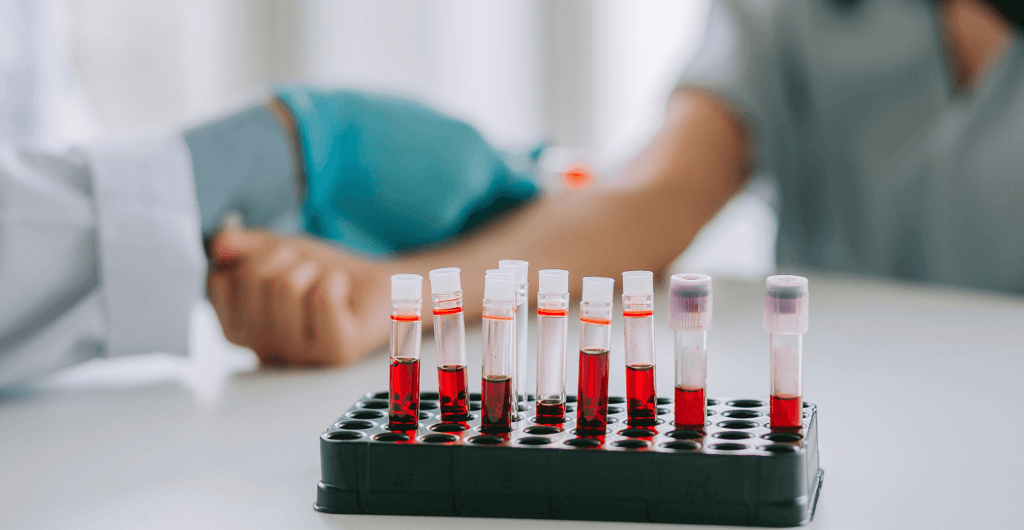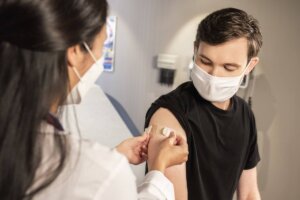In this article we bring you a summary of what we know about the immune response to SARS-CoV-2 and updated information on the latest T-Spot.COVID Test including a break-down overview of what is T-Spot technology, when to use a T-Spot Test, its accuracy, and how soon after infection and vaccination it is effective to take one.
What do we know about the immune response to COVID-19?
SARS-CoV-2 stands for Severe Acute Respiratory Syndrome Coronavirus 2. This is the virus that causes COVID-19, which as we know was first discovered in Wuhan, China in December of 2019 and declared a pandemic by the World Health Organization in March 2020.
COVID-19 is the contagious disease caused by the SARS-CoV-2 virus and continues to cause a varying degree of symptoms from mild to severe including difficulty breathing, pneumonia and sadly has resulted in hundreds of thousands of deaths globally. On the other end of the spectrum, some infected individuals suffer no symptoms at all and are therefore referred to as asymptomatic to the infection.
As the pandemic has progressed, different variants (mutations from the original SARS-CoV-2 infection) have also been discovered and the range of predominant mild and moderate symptoms has likewise changed from a dry, persistent cough and loss of smell and/or taste to a runny nose, sore throat, headache, and fever. These are also the current leading symptoms associated with the Delta variants. In terms of the immune response, the majority of people infected with COVID-19 generally develop a T cell and an antibody response against the virus within several weeks after initial exposure.
Why are T Cells important?
Our body has between 25 million and 1 billion T cells, which form an important part of the immune system. T cells do not attack general antigens but rather focus on specific foreign particles and circulate until they confront the specific foreign particle they are meant to attack.
T Cells produce a cellular-level immune response (which does not require existing antibodies) where Helper T cells – essential for all adaptive immune responses and, as the name suggests, helpers of other cells of the immune system – coordinate immune responses and activate B cells (or lymphocytes, one of the most important cells in the body that fight bacteria and viruses in response to a signal from a Helper T Cell) to form and release the proteins we know and refer to as antibodies, while Cytotoxic T cells kill virally infected host cells infected by the SARS-CoV-2 virus causing COVID-19. Antibodies attach to antigens and can also inhibit movement or stop some viruses from forming essential proteins.
What is the current situation regarding SARS-CoV-2 antibody testing?
Molecular and antigen tests are the primary testing methods used to confirm if someone is currently infected with COVID-19, as well as serology (antibody) testing that can highlight if there was a previous infection. Whilst useful in detecting the presence of a current and previous infection, these methods also have some limitations which might prevent giving a complete overview of someone’s immune response to COVID-19.
Antibody tests are helpful in revealing if someone has had an infection or a successful immune response to vaccination (Roche quantitative testing is the recommended test for vaccination response), though research indicates that antibody levels diminish or disappear over time. There is also evidence that some infected patients do not produce detectable levels of antibodies against COVID-19 so the use of antibody testing alone may not give the full picture of the incidence of the virus across populations.
In other words, you may be pretty sure that you had a previous infection for COVID-19 but either tested negative on PCR at the time, testing wasn’t available at that time or your antibody test came back negative. You may also have had the COVID-19 vaccine and tested negative for antibodies.
Understanding cell-mediated immunity may help to better understand the immune response to COVID-19 especially in individuals who do not produce a measurable antibody response, or whose antibody responses have decreased or disappeared over time. This testing method is called the T-Spot.COVID test.
What is a T-Spot.COVID test and how does the T-SPOT technology work?
The T-SPOT.COVID test has been developed using the standardised T-SPOT® technology testing platform. It is important to note that the T-SPOT.COVID test’s function is to detect a T cell response to the infection and not to diagnose a current COVID-19 infection. As mentioned earlier, the test is intended to identify patients who generate an immune response to the infection even if their serological test is negative.
The T cell response to the virus is generally measured in the blood a few days after initial infection – current estimates being one week from onset of symptoms – with data from a US clinical study of the T-SPOT.COVID test showing 100% agreement with previous positive PCR Swab Test results at 7-14 days (in all 4 samples tested) and 0-6 days (in the one sample tested) after a PCR positive test.
However, precise timing remains to be confirmed.
In terms of the technology itself, the Oxford Immunotec’s T-SPOT technology is based on the established ELISPOT assay method for measuring cells with regulatory approval in over 50 countries including the UK, EU, US, China and Japan and with more than 20 million tests using T-SPOT technology shipped worldwide to-date.
The technology ensures this is the most sensitive and specific test for measuring T cells as the test works by washing, counting, and normalising cell numbers (to create what is known as a cell suspension), which means it standardises the number of cells and removes serum factors (the fluid component of blood that includes all proteins not used in blood clotting) that could unfavourably impact results. To do so, a blood sample is collected by routine phlebotomy then used to collect and isolate a specific subset of white blood cells.
A standard number of these cells are then added in specifically designed plates and stimulated with the specific antigen under study – in this case, the SARS-CoV-2 virus – with cells that respond to the antigen releasing a chemical messenger known as cytokine. Cytokines are a group of proteins, peptides, and glycoproteins secreted by specific sells of the immune system.
The cytokine antibodies released during the test are used to encapsulate the cytokine as it is released by the cells with a secondary labelled antibody also then added to bind the captured cytokine. In addition, a detection reagent is also included which reacts with the secondary labelled antibody in a response that produces spots akin to footprints of where the cytokine was released. These spots are then numbered and counted.
The T-SPOT.COVID test is CE marked and has been submitted to the FDA for Emergency use authorization.
What is the test’s accuracy?
The data from the previously mentioned US clinical study shows an average percent positive agreement between the T-SPOT.COVID test and PCR testing of 96.6 % (84/87) at <60 days after positive PCR result, and 83.3% (40/48) at >60 days after a positive PCR result. A group of patients residing in an endemic region presumed negative (defined as low risk of infection and no previous positive results to PCR testing) showed an overall negative agreement of 98.0 % (98/100)1.
What does this mean?
A positive test result indicates that the individual tested has T Cells that are reactive to the afore-mentioned peptides specific to SARS-CoV-2 used in the T-SPOT.COVID test, which in turn indicates they are highly likely to have been exposed to the virus. As you have probably and correctly gathered, a negative result means the opposite and therefore the unlikelihood of having been exposed to the virus.
It is worth noting that the only way to understand the full immune response to COVID-19 is to test for both antibodies and T Cells.
Reference
- T-SPOT.COVID package insert – PI-T-SPOT.COVID-IVD-UK-V3

















37 responses
I’m pretty sure I had COVID 19 in January 2020. Would your test pic up T cell immunity
Dear Dr Lillingston, based on current research, this is unlikely.
Is this unlikely because the test cannot detect tcells generated from that time period, January 2020?
It’s less likely after that much time has elapsed, based on current research.
I’m looking to find out where I can get the T-Spot covid test to test for immunity. I want to know before I get the covid vaccine.
Dear Linda, we conduct the T-spot test here. You are welcome to test with us.
Where are you guys…Id like to get the test
We are in Central London!
I live in North Wales…..
seems we are out in the cold if we want testing….
daughter had two days of positive testing Lateral Flow about 4 weeks ago….
Wife and I tested daily but always negative….
Antibody test for daughter and us are negative….
Would like to understand why and a t-spot might help.
Thank you for your kind enquiry. We understand your predicament. In reality, it is highly likely that people in the same household have been exposed to the virus if one of you tests positive on lateral flow. If you are using lateral flow tests, there is a short window for detection, unlike PCR tests, which will pick up the infection over a broader period. In your case, a t-spot could only confirm whether at some point you’ve been exposed to COVID-19 but not developed igg antibodies, and also if you have residual immunity. It isn’t helpful as a diagnostic for current infection.
We would be happy to help you with your test requirement, Linda.
Does the T cell test show longterm immunity and are T cells still detectable in the blood after 16!months
Hi Melanie, the research on presence of T-cells has found a wide range of timescales where T-cells are detectable. It is not possible to advise you unfortunately.
Dear Sirs
Do you know if and where in France or The Netherlands I can get myself tested for Tcells?
I am a resident of The Netherlands working in France for an International Company.
I have visited China during time of outbreak and think I might have had Covid. A serological test was negative. I had one dose of Spikevax. I have a history of auto immune illness. Before I the a second dose I would like to know if and how much I am protected by me Tcells.
Thank you for your assistance.
Unfortunately, we are not aware of which international clinics are providing this test. If you are ever in London, we would be happy to help.
If I have a positive T-Spot test, and if it’s positive, can I use this as proof of exposure to Covid ? This is for travel purposes
Many Thanks
Hi Miles – for the purpose of travel, most destinations require a positive antibody test, not a T-cell test.
i would also like to take a test for t cell immunity as i had covid 19 in september
Hi Sean, you’re very welcome to book with us for this test. You can book online or call us.
Is there a combined quantitative antibody and T-cell test available in the UK?
We have a Roche Quantitative antibody test and T-cell package.
Can the C Tell test tell the difference between T Cells made due to Covid 19 infection and T Cells made due to vaccination ?
Unfortunately not
Does this test, test for T cell response following vaccination?
Yes, it tests for any t-cells present, however they were developed
I am pretty sure I had covid in Feb 2020, and have since had my two AZ vaccines. Would this test be suitable for me to prove the prior exposure?
This test will unlikely help as you have since had your vaccines. There is no way to distinguish between which t-cells were developed in response to the infection.
Can I do the test in Oxford please..
Our clinic is located in London, UK, just a couple of minutes walk from Harley Street.
Can you test my T cell immunity from Covid 19 and what my antibody levels are?? Thx 07973909651
Yes, we can test for both. Please book online or call us to arrange your appointment. We look forward to welcoming you.
As far as I know I haven’t had Covid. Does the T-Cell test only detect immunity as a result of previous infection or vaccination? Or would it show wether or not there is a natural immunity? Or is ‘natural immunity’ only acquired as a result of being exposed or vaccinated?
Yes, you must have an immune response to the infection.
Hi, I tested positive for COVID back in May 2020, though I was asymptomatic. But when I lived with 3 people who tested positive and were symptomatic in August 2021 I tested negative and never got sick, so I was wondering if my natural immunity has lasted for over a year and a half. I understand that antibodies can decrease overtime so I was wondering if I could get my T cell immunity tested and if it would be detectable if I haven’t had a recent infection?
Thank you.
It is difficult to predict unfortunately as T-cells also become undetectable after various time periods. This varies from person to person.
I have been testing on a weekly basis for the past year (mostly LFTs) and have never tested positive. Although I live alone and have worn a mask in shops etc, the chances are high that I have been exposed to COVID using London public transport to go to work 1 or 2 days per week. If I’ve had any symptoms (a few sneezes, runny nose, cough or headache), they would have been fleeting. I have declined vaccination and now stand to lose my job. Would this test demonstrate a significant level of immunity, perhaps conferred through exposure to Coronavirus in the past? Or even T-cell immunity due to exposure during the current pandemic? Does it not make sense that T-cell immunity should qualify an individual for a medical exemption from vaccination?
No, neither presence of T-cells nor antibodies developed post-infection offer the same protection as a vaccine. Vaccination offers 5 times the level of protection as “natural immunity”.